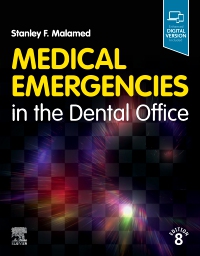
Medical Emergencies in the Dental Office Elsevier eBook on VitalSource, 8th Edition
Elsevier eBook on VitalSource

Prepare your students to prevent, recognize and manage life-threatening medical emergencies! Medical Emergencies in the Dental Office, 8th Edition helps students learn the skills needed to manage health issues in the dental office or clinic. The text describes how to recognize and manage medical emergencies promptly and proactively and details the resources that must be on hand to effectively deal with these situations. Written by noted dentistry educator Dr. Stanley Malamed, this expert text includes the latest guidelines for drug-related emergencies, cardiac arrest, and more. An enhanced eBook is included with each new print purchase, featuring a complete, fully searchable version of the text, a test bank of 300 questions and answers, and much more.
-
- UPDATED content includes the most current guidelines for drug-related emergencies, unconsciousness, altered consciousness, and cardiac arrest as well as protocols for obstructed airway management
- UPDATED PCABD boxes reflect the American Heart Association’s new algorithm for stabilizing and treating patients with an easy-to-remember acronym (PCABD): Positioning, Circulation, Airway, Breathing, and Definitive Management
- UPDATED! Emergency drug and equipment kit instructions help with assembling emergency kits and ensure that dental offices have safe, current materials on hand.
- Step-by-step procedures include detailed, sequential instructions for stabilizing and treating victims (PCABD) in common medical emergencies
- Logical format reflects the way emergencies are encountered in a dental practice, with chapters organized by commonly seen clinical signs and symptoms, such as unconsciousness or altered consciousness, respiratory distress, seizures, allergic reactions, chest pain, and cardiac arrest
- Full-color illustrations demonstrate emergency techniques with realistic clarity
- A differential diagnosis chapter ends each of the book’s parts on common emergencies
- Summary tables and boxes make it easy to find essential concepts and information
- Quick-reference algorithms in the appendix include step-by-step diagrams showing the decision-making process in common emergency situations
- An enhanced eBook is included with each new print purchase, featuring a fully searchable version of the text, an image collection, a test bank of 300 questions and answers, and more
-
- UPDATED content includes the most current guidelines for drug-related emergencies, unconsciousness, altered consciousness, and cardiac arrest as well as protocols for obstructed airway management
- UPDATED PCABD boxes reflect the American Heart Association’s algorithm for stabilizing and treating victims with an easy-to-remember acronym (PCABD): Positioning, Circulation, Airway, Breathing, and Definitive Management
- UPDATED! Emergency drug and equipment kit instructions help you assemble emergency kits and ensure that your dental office has safe, current materials on hand
-
Part 1: Prevention
1. Introduction
2. Prevention
3. Preparation
4. Legal Considerations
Part 2: Unconsciousness
5. Unconsciousness: General Considerations
6. Vasodepressor Syncope
7. Postural Hypotension
8. Acute Adrenal Insufficiency
9. Unconsciousness: Differential Diagnosis
Part 3: Respiratory Distress
10. Respiratory Distress: General Considerations
11. Foreign Body Airway Obstruction
12. Hyperventilation
13. Asthma
14. Heart Failure and Acute Pulmonary Edema
15. Respiratory Distress: Differential Diagnosis
Part 4: Altered Consciousness
16. Altered Consciousness: General Considerations
17. Diabetes Mellitus: Hyperglycemia and Hypoglycemia
18. Thyroid Gland Dysfunction
19. Cerebrovascular Accident
20. Altered Consciousness: Differential Diagnosis
Part 5: Seizures
21. Seizures
Part 6: Drug-Related Emergencies
22. Drug-Related Emergencies: General Considerations
23. Drug Overdose Reactions
24. Allergy
25. Drug-Related Emergencies: Differential Diagnosis
Part 7: Chest Pain
26. Chest Pain: General Considerations
27. Angina Pectoris
28. Acute Myocardial Infarction
29. Chest Pain: Differential Diagnosis
Part 8: Cardiac Arrest
30. Cardiac Arrest
31. Pediatric Considerations


 as described in our
as described in our 